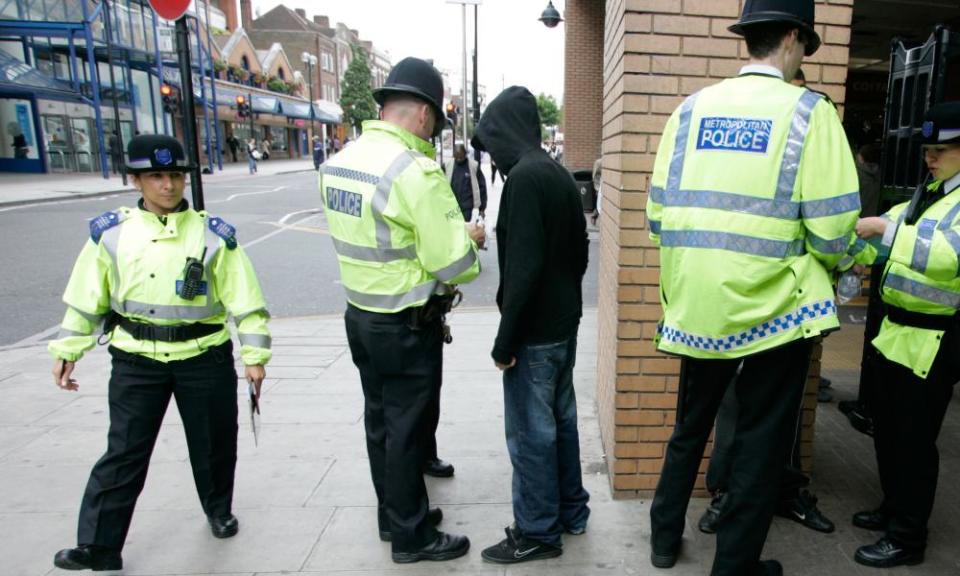Boris Johnson says stop and search is ‘kind and loving’. He’s gaslighting Black people

Yesterday I was reminded, yet again, that a policy of “fighting crime” can quickly morph into punitive policing and an attack on civil liberties. For the record, I am not anti-police, nor am I against tackling violent crime. What I am against is racial discrimination and oppressive police practices. Here we are, a year on from the unprecedented mass mobilisation of people at Black Lives Matter protests across the UK and numerous discussions about racial disparity in the criminal justice system have taken place. Yet it is clear the government has learned nothing in the past 12 months. Absolutely zilch.
Related: What is Boris Johnson offering in his crime reduction plan?
Had any lessons been learned, then the policing policies announced yesterday would be grounded in evidence-based solutions rather than simply being rehashed political grandstanding.
Let us be under no illusion, Boris Johnson knows exactly what he is doing when he invokes the words “kind and loving” to describe using and “enhancing” section 60 stop-and-search powers. For those who are unaware, section 60 of the 1994 Criminal Justice and Public Order Act is infamous: it allows officers to stop people “without suspicion”, and was invoked for 18,000 searches last year, yet found only 255 people with weapons. Under its powers, Black people are 18 times more likely to be searched overall than white people, and it’s had a hugely damaging impact on communities where incidents of violence have occurred. So the prime minister, in using those words, was in effect gaslighting every Black person who’s been wrongly stopped.
Of course, as a society we expect the police to have sufficient powers to tackle crime in order to keep us safe; however, we should all be deeply concerned that we are being misled. One need only refer to reports on the inefficiency of stop and search as a tactic, which were published by the Home Office and the College of Policing. Theseprovide evidence to dismiss the approach announced by the government yesterday.
It is frustrating and saddening when I see politicians exploit grief. On the many occasions I have spoken with and listened to parents who’ve lost children in violent attacks, the discussion has not been about whether they do or do not support stop and search: rather, it’s been that, if stop and search works so well, why didn’t it save my child? To be clear, I do not believe the parents are blaming the police. They are merely recognising that the current approach does not keep people safe.
It is my belief, and that of many civil society organisations, that the powers already on the statute books give the police sufficient authority to search people, so do not need to be enhanced. So, if not stop and search, what can be done to make our communities safe?
First, we need to accept that we cannot “police” our way out of the societal issue of violence and in particular “street crime”. It is illogical, unfair and ineffective to pursue an enforcement-led approach. Obviously, people who commit crimes need to be held accountable. However, we must not let the many suffer for the sins of the few – and stop-and-search policing does exactly that, by rounding up thousands of innocent people each year.
Second, we should take a closer look at the causes of violent crime. Ultimately, the solution to the long history of violence in society is a complex one. So we need to ask, what is it that pushes a person to harm somebody else? How do we curb violence? I am astounded at the lack of financial resources put into non-police initiatives such as restorative justice, conflict resolution and de-escalation.
There are fantastic organisations, working directly with people who have committed violent acts or are at risk of becoming victims, for which increase support could make a real difference. That’s because they have the trust of their communities.
Looking deeper and wider, we must also improve the way we tackle domestic violence, educational underachievement and exploitative relationships. Access to well-paid and meaningful employment opportunities also plays a role in creating the socially cohesive and safe society we all desire.
So our government should forget the tough talk and the grandstanding over stop and search – the police do not need any more powers. Now is the time to invest in crime prevention initiatives that will really have an impact.
Katrina Ffrench is founding director of Unjust-UK

 Yahoo News
Yahoo News 